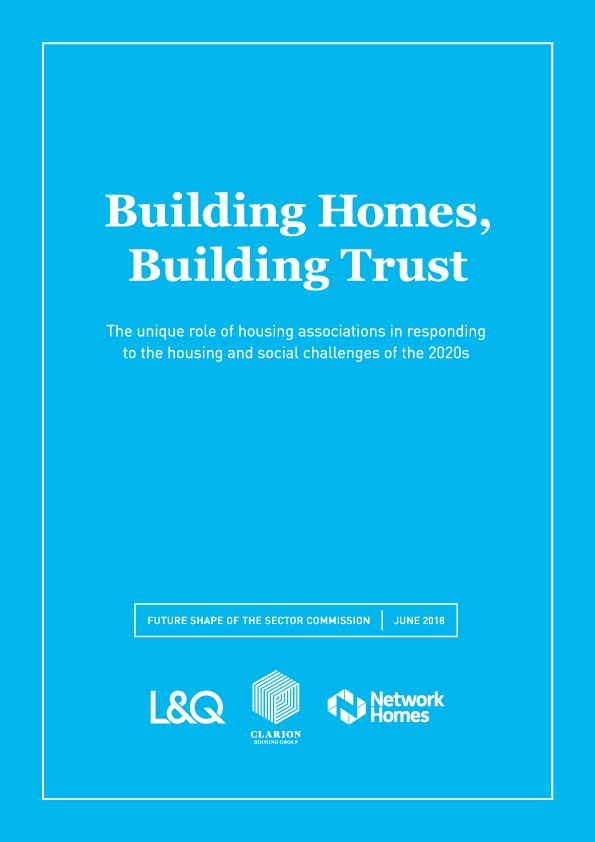High profile commission on future for housing associations publishes final report
25 June 2018
Housing associations will need to double their development outputs to 80,000-100,000 new homes a year in the 2020s and should ‘remake the contract’ with their residents for a digital, post-Grenfell age, according to the final report of the Future Shape of the Sector Commission, published today.
The Commission, chaired by former Cabinet Secretary, Lord Andrew Turnbull, and including high profile figures from the social policy and housing worlds, took evidence from more than 60 prominent organisations and individuals. Its six key conclusions were:
- The new political consensus about the scale of the housing crisis, the importance of social rented and affordable housing, and the key role housing associations can play in tackling the broken market presents a crucial moment of opportunity for the sector which housing associations must recognise and seize.
- The flexibility and diversity of their business model, their commitment to social purpose, and the differing constraints on other providers make housing associations uniquely well placed to respond to the housing and social challenges of the 2020s. They can achieve a great deal through their own resource and commitment, but even more with additional support and subsidy from key partners in local and national government.
- Housing associations must earn that support and subsidy by demonstrating their unfailing commitment to their customers and communities. The combination of the move to digital service, the need to respond to the wide ranging implications for social housing of the Grenfell Tower tragedy, and a rising sense of loss of trust among some stakeholders mean housing associations should remake the contract with customers, reviewing the landlord service offer from beginning to end.
- To support delivery of 300,000 homes a year, housing associations will need to at least double their development output to around 80,000-100,000 new homes annually and sustain that figure. This is a major upscaling and will require real change in financial innovation and risk management, strategic use of assets, use of new technology, inter-association collaboration and co-operation, and partnerships with others. Continued access to affordable land and government subsidy will be needed to increase delivery of homes at sub-market rents and prices.
- Housing associations should focus on areas and products where they can make the biggest difference, whether to affordability, particular client groups, or the economic prospects of communities. As long-term community investors rooted in social purpose, housing associations can deploy patient capital to deliver a rounded social and economic offer, operating powerfully across the full spectrum of the housing market, and cyclically or counter-cyclically depending on the country’s needs and as subsidy support allows. This is their unique and differential offer.
- All of this will demand significant change to the governance model. Housing associations will need clarity of strategic direction, with board members more knowledgeable, involved and integrated into the working of their organisations than ever before. Associations will need to recruit greater diversity of skills and experience at board level, be more open and transparent to customers and stakeholders, and substantially upgrade their succession planning and talent management programmes.
The Future Shape of the Sector Commission was created by Network Homes, L&Q and Clarion Housing Group to examine how housing associations should evolve to tackle England’s significant social and economic challenges for the 2020s. The aim is to ensure the sector grows and changes in the best interests of customers, stakeholders and society at large.

The Commission’s report places social purpose absolutely at the heart of the future for housing associations. As a sector we want to deliver as many genuinely affordable homes as we can – for social rent but also for others who the housing market is failing. But if Grenfell has taught us anything, it is that, even as we scale up development activity, we must keep the people who live in our homes front and centre, rethink our service offer for a digital age and ensuring we maintain the trust of residents and other stakeholders.
Helen Evans, Network Homes Chief Executive
Notes to editors:
- The Commissioners were: Lord Turnbull (Crossbench peer, former Cabinet Secretary and Head of the Civil Service 2002-2005); Torsten Bell (Director, Resolution Foundation); Sinead Butters (CEO, Aspire Group, chair of Placeshapers); Aman Dalvi (Board director, Henley Homes); Steve Douglas (Co-CEO, Altair and chair of One Housing Group); Helen Evans (CEO, Network Homes); John Hills (Professor of Social Policy, London School of Economics); Carol Matthews (CEO, Riverside HG and Chair of Homes for the North); Clare Miller (Group Director, Governance & Compliance, Clarion HG); David Montague (CEO, L&Q); Piers Williamson (CEO, The Housing Finance Corporation)
- The Commission considered detailed submissions from 35 organisations and individuals; conducted 15 in-depth interviews with prominent figures in government, government agencies, Commissioners and other housing association CEOs; ran three roundtable discussions in Liverpool, Birmingham and London; conducted study visits to exemplar projects; consulted the CIH Futures Group of young leaders; and developed an evidence base of key social and economic trends. The work was carried out between October 2017 and May 2018.
- The project was led and managed by a Secretariat from Network Homes, L&Q and Clarion HG, working with Lord Turnbull.

